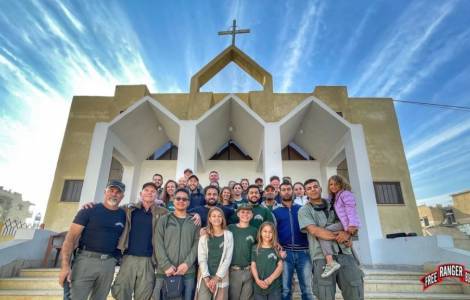In Raqqa, the city that became the Syrian stronghold and capital of the self-proclaimed Islamic State (Daesh) from January 2014 to October 2017, an office of the High Committee for Real Estate was recently opened, whose mission is to “protect” the properties of Christian owners, who left the region during the years of the Syrian conflict, from unlawful expropriation.
In an interview with the online newspaper SyriacPress, Secretary of the High Committee for Real Estate Fadj Jajo emphasizes the importance of this initiative and describes it as an example of the policy to protect the rights of minorities from the forces currently ruling in the region. The initiative is particularly important because it takes place in an area of Syria that has not been controlled by the government in Damascus for a long time.
Raqqa in particular was bombed during the anti-Daesh coalition aimed at breaking the resistance of the jihadist militias. The Syrian Democratic Forces (SDF, a predominantly Kurdish coalition of militias) supported and armed by the United States liberated the city. Since then, the area in north-eastern Syria has been controlled by the “Democratic Autonomous Administration of the Region of North and East Syria, DAARNES”, a de facto autonomous entity, not officially recognized by the Syrian government, dominated by Kurdish forces and supported militarily by the USA.
The ad hoc branch of the committee, said Jajo, is tasked with cataloging real estate – houses and land – of Armenian, Syrian and Assyrian Christian owners, with the primary aim of ensuring that property unlawfully expropriated, taking advantage of their forced exodus, will also be returned to them.
Armin Mardoian, administrative officer of the Committee, affirmed his commitment to “protecting the property and sacred sites of the Syriac (Syrians, Assyrians, Chaldeans) and Armenian peoples”. He emphasized cooperation with the Autonomous Administration of Northeast Syria to ensure the return of property to its rightful owners.
The declared intent of the policy, launched by the political entity that de facto controls the area, is to facilitate the return of Christians from native communities displaced during the long-running conflict that has torn Syria apart.
The Autonomous Administration of Northeast Syria, which is not internationally recognized, sees itself as a guarantor of policies that respond to the needs of religious minorities.
In Raqqa, the tactics used by the forces that control the region against the local Christian communities are evident, not least in the reconstruction of the Church of the Martyrs, which was reduced to rubble during the war. The church, which belonged to the Armenian Catholic Church, had long been in the hands of Islamic State militiamen, who had turned it into a court and from there dictated the law and enforced their jihadist “justice.” Then it was devastated by Western-led bombings which razed a good part of the urban center, when the Syrian capital of the Black Caliphate was about to be conquered. In recent years, the church of the Martyrs (see Fides, 18/2/2022), has been rebuilt as new (see photo) by a singular para-military movement, the Free Burma Rangers, formed in the conflicts between ethnic militias and the Burmese army, at the initiative of the American evangelical pastor Dave Eubank, who attended the “Fuller Theological Seminary” (considered among the most influential evangelical training institutes) and at the same time a former US Army Special Forces officer.
Inside the church there is no altar, but rather a pulpit for preaching, as is common in evangelical churches.
After the inauguration, only the few dozen Christians staying in Raqqa were invited to visit the rebuilt church. “They say it is our church and that they have rebuilt it for the Christians of Raqqa,” Archbishop Boutros Marayati told Fides in February 2022, “but we don’t know anything about it. The initiative aims to send a message: let’s rebuild churches and defend Christians. But we have nothing to do with such operations”
By:fides






